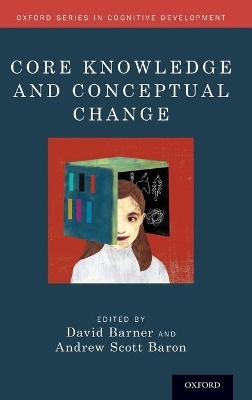
Core Knowledge and Conceptual Change
Oxford University Press Inc (Verlag)
978-0-19-046763-0 (ISBN)
We acquire concepts such as "atom," "force," "integer," and "democracy" long after we are born; these concepts are not part of the initial cognitive state of human beings. Other concepts like "object," "cause," or "agent" may be present early in infancy--if not innately. Processes of change occur throughout our conceptual development, which prompts two key questions: Which human concepts constitute innate, core knowledge? How do humans acquire new concepts, and how do these concepts change in development?
Core Knowledge and Conceptual Change provides a unique theoretical and empirical introduction to the study of conceptual development, documenting key advances in case studies, including ground-breaking science on human representations of language, objects, number, events, color, space, time, beliefs, and desires. Additionally, it explores how humans engage in moral reasoning and causal explanation: Are humans born good and tainted by an imperfect world, or do we need to teach children to be moral? Could a concept like "freedom" be woven into the human soul, or is it a historical invention, constructed over generations of humans? Written by an eminent list of contributors renowned in child development and cognitive science, this book delves widely, and deeply, into the cognitive tools available at birth that are repurposed, combined, and transformed to complex, abstract adult conceptual representations, and should be of interest to developmental psychologists, linguists, philosophers, and students of cognitive science.
David Barner, PhD, is a Professor of Psychology and Linguistics at the University of California, San Diego. Dr. Barner studies the origin of human language and thought by studying how they develop in children in diverse cultural and linguistic contexts. Andrew Scott Baron, PhD, is an Assistant Professor of Psychology at the University of British Columbia, Canada. Dr. Baron's research explores the nature of the human capacity to be prejudiced by examining infants' and young children's tendency to categorize others into social groups and to form positive and negative attitudes and beliefs about these groups.
List of Contributors XI
Acknowledgements XIV
Part I: INTRODUCTION 1
1 An Introduction to Core Knowledge and Conceptual Change
(David Barner & Andrew Scott Baron) 1
Part II: processes of conceptual change #
2 Some Preliminary Thoughts on a Rational Constructivist Approach to Cognitive
Development: Primitives, Symbols, Learning, and Thinking
(Fei Xu) #
3 How is Conceptual Change Possible? Insights From Science Education
(MariAnne Wiser & Carol L. Smith #
4 Bundles of Contradiction: A Coexistence View of Conceptual Change
(Andrew Shtulman & Tania Lombrozo) #
5 Conceptual Change: Where Domain-Specific Learning Mechanisms Meet Domain-
General Cognitive Resources
(Deborah Zaitchik, Gregg E.A. Solomon, Nathan Tardiff, & Igor Bascandziev) .....#
6 Surprise Enhances Early Learning
(Lisa Feigenson) #
Part III: Abstract Concepts #
7 Inferring Number, Time, and Color Concepts From Core Knowledge and
Linguistic Structure
(Katie Wagner, Katharine Tillman, & David Barner) #
8 Different Faces of Language in Numerical Development: Exact Number and
Individuation
(Susan Levine & Renee Baillargeon #
9 How Numbers are Like the Earth (and Unlike Faces, Loitering or Knitting)
(Barbara Sarnecka) #
10 Epistemic Limitations and Precise Estimates in Analog Magnitude
Representation
(Justin Halberda) #
11 A Framework for Frames of Reference
(Anna Shusterman & Peggy Li) #
Part IV: Linguistic Structure #
12 Mechanisms for Thinking about Kinds, Instances of Kinds, and Kinds of Things
(Sandeep Prasada) #
13 Concepts as Explanatory Structures: Evidence From Word Learning and the
Development of Lexical Flexibility
(Mahesh Srinivasan) #
14 Conceptualizing the Event: The Relationship Between Infants' Representations
and Linguistic Organization
(Laura Lakusta & Laura Wagner) #
15 When Children Don't Say What They Know: Syntax Acquisition and Executive
Function
(Virginia Valian) #
Part V: Social and moral Cognition #
16 Core Knowledge and Conceptual Change: A Perspective on Social Cognition
(Elizabeth S. Spelke) #
17 Is False Belief Understanding Continuous from Infancy to Preschool Age?
(Beate Sodian) #
18 What Neuroscience can Reveal about Cognition and its Origins?
(Amy Skerry & Rebecca Saxe) #
19 What Develops in Moral Development?
(Paul Bloom & Karen Wynn) #
20 Developmental Origins of Social Group Preferences
(Andrew Scott Baron, Yarrow Dunham, & Anthea Pun) #
Index
| Erscheinungsdatum | 01.08.2016 |
|---|---|
| Reihe/Serie | Oxford Series in Cognitive Development |
| Verlagsort | New York |
| Sprache | englisch |
| Maße | 231 x 155 mm |
| Gewicht | 408 g |
| Themenwelt | Geisteswissenschaften ► Psychologie ► Allgemeine Psychologie |
| Geisteswissenschaften ► Psychologie ► Entwicklungspsychologie | |
| Geisteswissenschaften ► Psychologie ► Pädagogische Psychologie | |
| Geisteswissenschaften ► Psychologie ► Verhaltenstherapie | |
| ISBN-10 | 0-19-046763-0 / 0190467630 |
| ISBN-13 | 978-0-19-046763-0 / 9780190467630 |
| Zustand | Neuware |
| Informationen gemäß Produktsicherheitsverordnung (GPSR) | |
| Haben Sie eine Frage zum Produkt? |
aus dem Bereich


